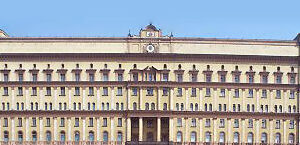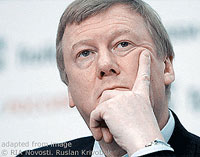Attack on Chubais Ally Marks Death of Russian Meritocracy – Experts

(Moscow Times – themoscowtimes.com – Ivan Nechepurenko – July 4, 2015)
The criminal case opened this week against Leonid Melamed, the founder of Russia’s flagship innovations project, is directed against its divisive current head Anatoly Chubais, and reflects Russia’s drift away from a merit-based ruling elite, pundits told The Moscow Times on Friday.
Rusnano’s reformist head Chubais has long been a target for the country’s security services due to his broadly unpopular liberal economic policies, according to experts, and Melamed is widely perceived as his long-term ally. The move against Melamed and his former colleagues is designed to send a message to Chubais, they said.
“The security apparatus has been looking into how to attack Chubais, but there was no permission from the Kremlin. Now it seems that permission has been granted,” said Igor Bunin, head of the Center for Political Technologies think tank in Moscow.
Dmitry Oreshkin, a prominent political analyst, said he sees a wider trend in Melamed’s detention.
“The competent, merit-based elite is being replaced by a more primitive and barbarian one. [Former Finance Minister] Alexei Kudrin and Chubais are economists and understand perfectly that the country has come to a dead end, so naturally there is no place for them in the system,” Oreshkin said.
FSB Swoops In
Melamed was detained in Moscow on Wednesday by police and officers from the Federal Security Service (FSB), a successor agency to the Soviet-era KGB. His apartment was searched and investigators said he is suspected of large-scale embezzlement of state funds at the Rusnano corporation committed as part of a conspiracy by an organized group.
Moscow’s Basmanny court ruled to put Melamed under house arrest on Friday while the investigation is under way. If charged and convicted, he faces up to 10 years in prison along with a fine of up to 1 million rubles ($18,000).
According to investigators, together with two other key employees, in 2007-2009 Melamed embezzled more than 220 million rubles ($4 million) from Rosnanotech, the company that later evolved into Rusnano, siphoning off the funds as payment for consulting services to a company that he owned. Melamed was CEO of Rosnanotech for just over a year in 2007-2008 before he was succeeded by Chubais.
Melamed said in court on Friday that the accusations against him are “ungrounded” and said he is ready to cooperate with the investigation, Interfax reported.
Rusnano to the Rescue
On Thursday, Rusnano attempted to defend its former head by issuing a statement in which it said the contract with Melamed’s company had been signed after an open tender with five contestants.
“By the time of the tender, Melamed was no longer working at Rosnanotech,” the statement said. “Rusnano has no grounds to believe that any material damage was incurred by Rosnanotech as a result of this contract,” it said.
Investigative Committee spokesman Vladimir Markin described Rusnano’s statement as “strange.”
“Before leaving Rusnano, Melamed had created all the conditions for state funds to be transferred to the company that he controlled, thus providing a golden parachute for himself,” said Markin.
According to its website, Rusnano’s mission is “furthering public policy to win a leading role for Russia on global nanotechnology markets.” The company has already poured more than 100 billion rubles into tech industries in Russia – including in the fields of solar energy, medicine and biotechnology – making it one of the country’s largest technology investors.
Expected sales from Rusnano’s portfolio companies will total more than 300 billion rubles in 2015, according to its website. In addition to Russia, Rusnano also has offices in the United States and Israel.
Hated Figure
Rusnano’s current head Chubais, a member of the St. Petersburg circle of economists who reformed the Soviet planned economy into a market one, may be regarded by some analysts as the country’s top reformer, but he is widely despised by the Russian public.
Chubais is seen as being behind the controversial loans for shares privatization scheme that in the eyes of many Russians put the most lucrative chunks of Soviet assets into the hands of a few oligarchs in the 1990s.
Reacting to the news of Melamed’s detention, Chubais said on his Twitter account that he was glad that Melamed had not been kept in detention.
“Nevertheless, we regard house arrest as excessive,” said Chubais.
In addition to his reputation as public enemy no. 1, Chubais has made enemies among the country’s political elite. In 2012, the Communist Party asked the Audit Chamber to look into Rusnano’s affairs. According to Forbes magazine, the Audit Chamber found “serious violations” in the company’s work that could have been connected to corruption. Chubais dismissed the allegations at the time.
The criminal investigation into Melamed’s activities was opened back in 2012, the TASS news agency cited an unidentified source as saying Thursday, but remained idle for nearly three years.
No Longer Useful
Several prominent economists have left Russia in recent years. Sergei Guriyev, a former rector of the New Economic School in Moscow, left in 2013 after being interrogated by law enforcement officials. His former colleague at the school, Konstantin Sonin, followed him in March this year.
In a recent column for The Moscow Times, Sonin defended Chubais, calling him “one of a kind in Russia.”
Bunin said that Chubais has been able to stay in government for more than two decades because he has two advantages: He is a skilled manager and has useful connections in the West.
“Today these connections are no longer needed, given the confrontation over Ukraine, while his managerial skills have little application at Rusnano, a utopian project from the beginning,” said Bunin.
Critics have said that instead of creating a single state-run innovation project aimed at manually diversifying the country’s oil-dependent economy, the government should have created a better investment climate that would have helped such projects to emerge naturally.
Oreshkin offered a broader interpretation of the perceived move against Chubais.
“In a situation where instead of implementing reforms, the country is turning into an autarky, the system is forced to eliminate such people from the government,” Oreshkin said in a phone interview.
“What is happening can be described as the Chechenization of Russia,” he said, drawing parallels with the southern republic whose head, Ramzan Kadyrov, has created “a virtually independent polity with its own ideology, religious policy, security structures, economy and laws,” according to a recent report published by the International Crisis Group NGO.

